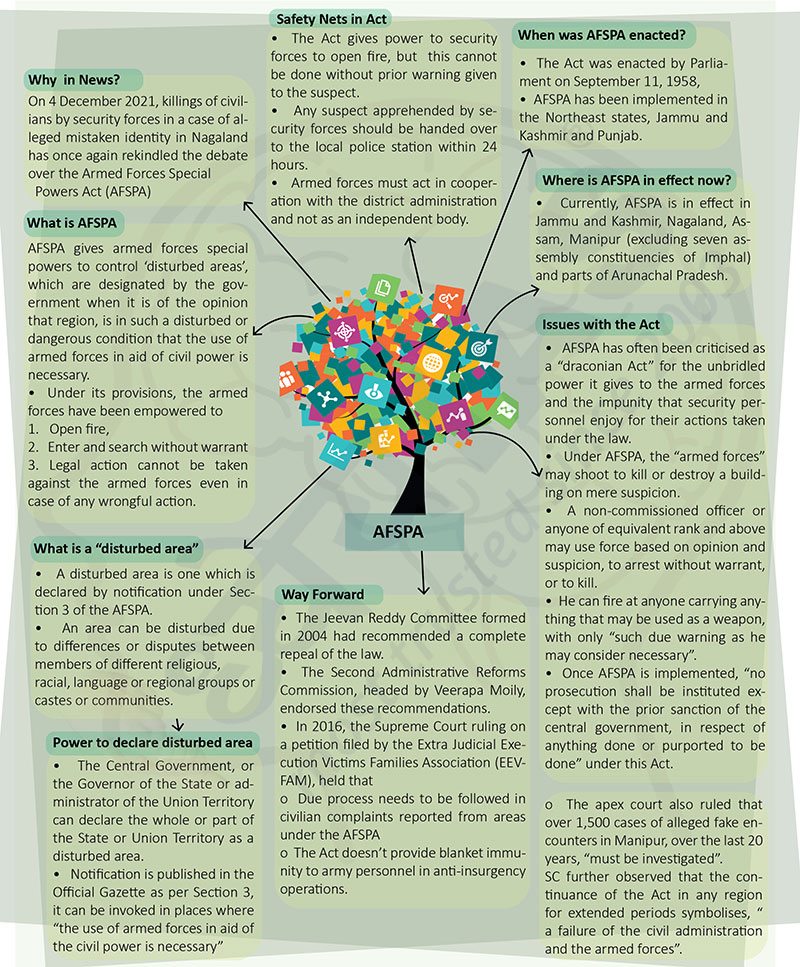Why in News?
- On 4 December 2021, killings of civilians by security forces in a case of alleged mistaken identity in Nagaland has once again rekindled the debate over the Armed Forces Special Powers Act (AFSPA)
What is AFSPA?
AFSPA gives armed forces special powers to control ‘disturbed areas’, which are designated by the government when it is of the opinion that region, is in such a disturbed or dangerous condition that the use of armed forces in aid of civil power is necessary.
- Under its provisions, the armed forces have been empowered to
- Open fire,
- Enter and search without warrant
- Legal action cannot be taken against the armed forces even in case of any wrongful action.
What is a “Disturbed Area”?
- A disturbed area is one which is declared by notification under Section 3 of the AFSPA.
- An area can be disturbed due to differences or disputes between members of different religious, racial, language or regional groups or castes or communities.
Power to declare disturbed area
- The Central Government, or the Governor of the State or administrator of the Union Territory can declare the whole or part of the State or Union Territory as a disturbed area.
- Notification is published in the Official Gazette as per Section 3, it can be invoked in places where “the use of armed forces in aid of the civil power is necessary”
Safety Nets in Act
- The Act gives power to security forces to open fire, but this cannot be done without prior warning given to the suspect.
- Any suspect apprehended by security forces should be handed over to the local police station within 24 hours.
- Armed forces must act in cooperation with the district administration and not as an independent body.
When was AFSPA enacted?
- The Act was enacted by Parliament on September 11, 1958,
- AFSPA has been implemented in the Northeast states, Jammu and Kashmir and Punjab.
Where is AFSPA in effect now?
- Currently, AFSPA is in effect in Jammu and Kashmir, Nagaland, Assam, Manipur (excluding seven assembly constituencies of Imphal) and parts of Arunachal Pradesh.
Issues with the Act
- AFSPA has often been criticised as a “draconian Act” for the unbridled power it gives to the armed forces and the impunity that security personnel enjoy for their actions taken under the law.
- Under AFSPA, the “armed forces” may shoot to kill or destroy a building on mere suspicion.
- A non-commissioned officer or anyone of equivalent rank and above may use force based on opinion and suspicion, to arrest without warrant, or to kill.
- He can fire at anyone carrying anything that may be used as a weapon, with only “such due warning as he may consider necessary”.
- Once AFSPA is implemented, “no prosecution shall be instituted except with the prior sanction of the central government, in respect of anything done or purported to be done” under this Act.
Way Forward
- The Jeevan Reddy Committee formed in 2004 had recommended a complete repeal of the law.
- The Second Administrative Reforms Commission, headed by Veerapa Moily, endorsed these recommendations.
- In 2016, the Supreme Court ruling on a petition filed by the Extra Judicial Execution Victims Families Association (EEVFAM), held that
- Due process needs to be followed in civilian complaints reported from areas under the AFSPA
- The Act doesn’t provide blanket immunity to army personnel in anti-insurgency operations.
- The apex court also ruled that over 1,500 cases of alleged fake encounters in Manipur, over the last 20 years, “must be investigated”. SC further observed that the continuance of the Act in any region for extended periods symbolises, “ a failure of the civil administration and the armed forces”.









